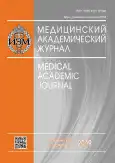ЭКСТРАКТ КУРКУМЫ В КОРРЕКЦИИ ПОКАЗАТЕЛЕЙ ФУНКЦИОНАЛЬНОЙ АКТИВНОСТИ НЕРВНОЙ И ИММУННОЙ СИСТЕМ ПРИ ЭКСПЕРИМЕНТАЛЬНОМ АЛКОГОЛИЗМЕ
- Авторы: Маркова ЕВ1, Гольдина ИА1,2, Гольдин БГ2,3, Княжева МА1, Савкин ИВ1
-
Учреждения:
- ФГБНУ «НИИ фундаментальной и клинической иммунологии»
- ФГБОУ ВО «Новосибирский государственный педагогический университет»
- ФГБОУ ВО «Новосибирский государственный медицинский университет» Минздрава России
- Выпуск: Том 19, № 1S (2019)
- Страницы: 215-217
- Раздел: Статьи
- Статья опубликована: 15.12.2019
- URL: https://journals.eco-vector.com/MAJ/article/view/19404
- ID: 19404
Цитировать
Полный текст
Аннотация
Целью данной работы было изучение влияния экстракта куркумы на показатели поведения, выраженность клеточного иммунного ответа у животных в состоянии экспериментального алкоголизма.Экспериментальная модель: мыши-самцы (CBAxC57Bl/6)F1 трехмесячного возраста (n = 60). Алкогольная зависимость у экспериментальных животных была сформирована методом 6-месячного спаивания 10 % раствором этанола. В контрольных группах животные получали воду или 10 % раствор этанола, в опытной группе - экстракт порошка куркумы в растворе этанола. Поведение мышей оценивали в тесте «открытое поле». Выраженность клеточного иммунного ответа к эритроцитам барана оценивали по интенсивности развития реакции гиперчувствительности замедленного типа.Было установлено, что использование экстракта куркумы на фоне приема раствора этанола приводит у животных в состоянии экспериментального алкоголизма к стимуляции поведения и повышении клеточного иммунного ответа до уровня, свойственного здоровым животным соответствующего возраста.Результаты свидетельствуют о протекторном эффекте куркумы в отношении ряда параметров функциональной активности нервной и иммунной систем при хронической интоксикации этанолом.
Ключевые слова
Полный текст
Об авторах
Е В Маркова
ФГБНУ «НИИ фундаментальной и клинической иммунологии»
И А Гольдина
ФГБНУ «НИИ фундаментальной и клинической иммунологии»; ФГБОУ ВО «Новосибирский государственный педагогический университет»
Б Г Гольдин
ФГБОУ ВО «Новосибирский государственный педагогический университет»; ФГБОУ ВО «Новосибирский государственный медицинский университет» Минздрава России
М А Княжева
ФГБНУ «НИИ фундаментальной и клинической иммунологии»
И В Савкин
ФГБНУ «НИИ фундаментальной и клинической иммунологии»
Список литературы
- Balanzá-Martínez V, Crespo-Facorro B, González-Pinto A, Vieta E. Bipolar disorder comorbid with alcohol use disorder: focus on neurocognitive correlates. Front Physiol. 2015;6:108.
- Aggarwal BB, Yuan W, Li S, Gupta SC. Curcumin-free turmeric exhibits anti-inflammatory and anticancer activities: Identification of novel components of turmeric. Mol. Nutr. Food Res. 2013;57:1529-1542.
- Goldina IA, Goldin BG, Gaidul KV. Clinical efficacy of turmeric in diseases of the nervous system. Neuroimmunology. 2015;XVII(2):265. (In Russ.)
- Goldina IA, Gaidul KV. Biological activity and therapeutic properties of Curcuma Longa L. (Literature review). Vestnik NSU. 2015;13(1):141-149. (In Russ.)
- Goldina IA, Markova EV, Goldin BG, et al. The protective properties of turmeric in ethanol-induced behavioral disorders. Saratov Journal of Medical Scientific Research. 2017;13(1):131-135. (In Russ.)
- Markova E, Knyazheva M, Savkin I, Shushpanova T. Effect of original anticonvulsant meta-chloro-benzhydryl-urea on behavioral and immune parameters in mice with active and passive behavior types in experimental alcoholism. European Psychiatry. 2017;41(S):S742-S743. (In Russ.)
- Markova EV, Obukhova LA, Kolosova NG. Parameters of cell immune response in Wistar and OXYS rats and their behavior in the open field test. Bulletin of Experimental Biology and Medicine. 2003;136(6):588-590.
Дополнительные файлы







